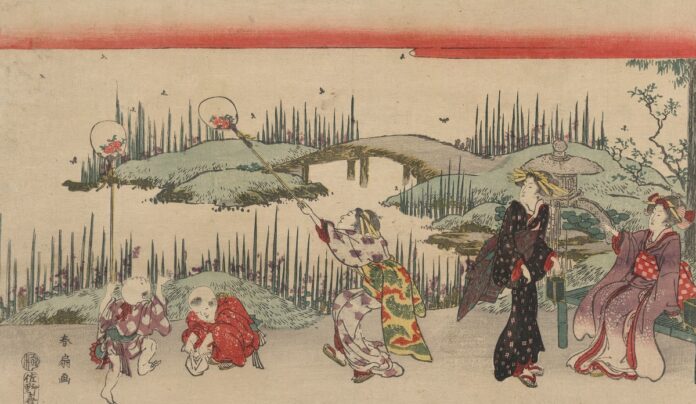Translation from the Russian by Alex Ben Zion
Tokyo. 1965.
As the years go by I find myself increasingly inclined to disappear into a bustling crowd. It’s common notion that as we grow older our longing for solitude grows. However my own experience tells a different story. The old solitary house in traditional Asakusa offered refuge but only if sleep descended quickly. Otherwise it felt like a trap evoking poignant memories. Memories summoned ghosts that haunted me, their presence reflected in the worn floorboards. Once shiny twenty years ago, the floor had now dulled and cracked with age, yet the ghosts paid no attention to its condition.
During the day, I could find escape to be among people. But sleepless nights turned into a true nightmare. I would light the worn-out Umé-Andon lantern and venture into the courtyard of the house. There, in the dim unsteady light pacing between two peach trees that no longer bore fruit. At the end of the courtyard lush bushes of Japanese yew grew but I never dare to approach as they seemed particularly unsettling at night and every random gust of wind rustling their leaves felt like a signal that someone was watching me hiding among the shrubbery.
In the morning, weak and tired I headed into the city, pushing myself to exhaustion, when nothing could touch me and I couldn’t concentrate on anything. Only then I’ve able to distract myself from exhausting memories of shadows of the past and fall asleep without fearing the dreams which as we know, mirror reality.
At this hour, Ginza Street was bustling with people. Officials in their business attire hurried along while women of various ages and incomes strolled leisurely. Tourists were easily spotted by their eager gazes absorbing everything they could to take back vivid impressions from this foreign land. Slowly I navigated through the crowd reflecting on how rare it had become to see a woman in a kimono on the streets of Tokyo. Their numbers dwindled. Only during holidays in the parks near the temples one could catch a glimpse of true Japan yet even then it all seemed like a carefully arranged stage set in our times. Not over centuries but within a single human life reality had shifted several times. And this left me hesitant.
From the corner of my eye something caught my attention – a woman standing by the window of an expensive store. I hardly knew anyone in Tokyo, old friends drifted away or passed on and I hadn’t made new ones knowing my somber demeanor wasn’t conducive to socializing. No female friends whatsoever since I am not young, always solemn and accustomed to solitary living.
Yet this woman standing with her back to me by the store window seemed familiar. In fact I recognized every gesture of hers – the subtle tilt of her head the hands hanging passively by her sides. I traced the line of her neck smoothly transitioning into rounded shoulders. She was dressed in a fashionable European dress tightly hugging her figure and high-heeled shoes. Her shoulder-length hair was so skillfully styled by a hairdresser that it resembled a tall wig. Only a few loose strands cascaded down her back glinting in the sun. It seemed this hairstyle called a “bob.” But in my memory this woman appeared in traditional attire with a face covered in white makeup, her neck hidden in the high collar of a lilac kimono. I couldn’t see her face yet for some reason I knew it was familiar to me. So I approached and quietly spoke her name.
*
Hiroshima. 1944.
In June 1944, Mrs. Ito Kaori the wife of a high-ranking military official from the military garrison Ito Masahiro decided to leave the dusty city of Hiroshima and spend a few days at their rural ancestral home in Asihara. During the war Hiroshima, a thriving city with its parks squares and temples transformed into military barracks. Several weapons factories and military warehouses had been erected and the streets filled with people in uniforms. Even Mr. Ito despite being a civilian was compelled to don a uniform since he now answered to the military governor of Hiroshima.
All of this was quite exhausting for Mrs. Ito who recently turned thirty. She loved bright colors elegance and celebrations. Military life was not on her wish list and as time went on Mrs. Ito’s spirits sank lower. Not that she was suffering from any illness, on the contrary she was in robust health she didn’t even know what a cold was. But that nervous state causing a dull irritation and protest against everything that now surrounded her she simply called “spiritual consumption” and yearned to the point of a headache to escape the city and breathe in fresh rural air.
Her only daughter Maiko had reached the age of five. It was customary for girls of this age to start their education, with a love for beauty nurtured by attentive parents and teachers. She longed to introduce Maiko to the arts of dance painting and playing the shamisen. Yet due to the war Hiroshima’s cultural life appeared frozen with no end in sight.
While packing her suitcase Mrs. Ito placed several silk kimonos for herself and her daughter along with a bundle of obi belts. All of these had not been worn for a long time, they were stored in the closet in branded bags from Kiemori store. Unfortunately that store closed it’s doors.
Mrs. Ito sighed recalling better days and gently stroked the silk obi adorned with an image of blooming plum branches. The flowers felt slightly raised to the touch while silk around them remained smooth.
Meiko was stubborn. She didn’t want to leave Hiroshima and part ways with her perpetually messy neighbor Yukiko. Meiko even suggested taking her friend along, including all the dolls she had accumulated, both seen and unseen.
However, Mrs. Ito merely shook her head tired from the preparations.
“No,” she said to her daughter. “We’ll go together just the two of us and won’t take anyone else with us. We’ll walk along the riverbank and feed the ducks. There are so many ducks there.”
“But what will we do in the evening?” persisted Meiko. “In the dark we won’t be able to see the ducks. Maybe it’s better if we return home by evening?”
“In the evening, we’ll find something to entertain ourselves,” promised Mrs. Ito. “For now I won’t tell you what I’ve come up with. But I promise you’ve never seen anything like it.” How little it takes to calm a child. A car pulled up, the one that was supposed to take them to Asihara, and Meiko willingly settled into the back seat. Mr. Ito couldn’t leave his work to accompany them but sent his official car with a chauffeur. Seeing her husband absent Mrs. Ito raised her delicate eyebrows high and almost voiced everything she had been thinking over the years. About how Masahiro Ito didn’t pay her enough attention how negligent he was to their daughter and spent the time at work all day long. But without a worthy conversational partner nearby she refrained from saying anything, only a sorrowful crease on her forehead deepened slightly. The car jolted and swayed from side to side. Meiko clung to her mother with both hands. Mrs. Ito couldn’t hold back: “Could you drive a little slower?” she asked the chauffeur. “No,” he replied. “I’ve been allowed out for just an hour. You know that using official cars is illegal. I wonder what will happen if they catch on. It’s wartime.” Mrs. Ito wished so much she could forget about this wartime situation.
*
Asihara. 1944
I observed them from a distance. Sometimes through binoculars other times I got closer and saw everything firsthand. At times sitting in the car hidden amidst dense vegetation watching the house where nothing seemed to happen was unbearably dull. But then suddenly people appeared and put on a spectacle that compensated for hours of fruitless observation.
I arrived at the location two hours before Mrs. Ito and her daughter reached Asihara, spotting black government car parked by the house. Immediately the door opened and an elderly man in a dressing gown and geta hurried toward the car. Although nothing could be heard from such a great distance my imagination filled in the sound of geta striking the stone-paved path. Next Mrs. Ito emerged from the car and embraced the old man. It all unfolded like a silent movie, a girl stepped out of the car and stood aside shyly, hesitating to approach. The chauffeur retrieved a large suitcase carefully placed it on the roadside then promptly returned to the car and started the engine. Before the dust settled the picturesque trio—the old man Mrs. Ito and the girl—had already disappeared inside the house.
Once again the hours of waiting seemed endless. I was starting to doze off nearly falling asleep as I leaned back in the car seat. Suddenly I jolted up and raised the binoculars to my eyes. A maid appeared on the veranda with a tray, setting the table for dinner. She arranged a variety of plates and cups on the low table along with chopsticks and napkins. The darkness closed in and the maid went back into the house only to return with a lit lantern that she placed on the railing.
After a moment, Mrs. Ito arrived accompanied by her father and daughter. She wore a light green kimono adding to her already graceful presence. Seating herself at the table with a feline elegance she folded her legs beneath her straightened her back and lowered her shoulders, a formal posture that seemed out of place among family. Perhaps her tension hinted at strained relations with her father or maybe it was simply shyness from their prolonged separation. It wasn’t my place to delve into their family dynamics, no one ordered me to analyze it. Yet inexplicably I found myself drawn to observing her constructing her image in my mind with new details. I admired her gestures how delicately she handled the chopsticks and turned to her daughter in response to a question. I admired her like one admires blooming chrysanthemums or a full moon captivated by her presence but content without reciprocation. In the lantern’s glow she resembled a puppet from a theater of shadows, beautiful and refined yet with an air of stillness lacking the vitality of life.
Then they entered the house. I waited until the lights went out before driving back into the city to deliver the report to my superiors have a meal and unwind.
Early in the morning, I returned to my post. The day went on as usual. Mrs. Ito either strolled among the trees or sat on the veranda in a rocking chair while her daughter jumped ran and played with her doll leading child’s life incomprehensible and uninteresting to adults. Sometimes the girl would run up to her mother and then I saw smiles on their faces and joy in being together. For her sake, for Mrs. Ito alone I managed to convince my superiors to allow another day of freedom for this family.
It was already eight o’clock in the evening when I saw them again, heading towards the river. I leaped out of the car and followed them at a respectable distance. Mrs. Ito had transformed. Now she was dressed in a festive silk kimono, her hairstyle adorned with long pins that chimed delicately with every step. Her face and neck were thickly covered in white makeup. The girl was also in a kimono and meticulously groomed, resembling a doll.
I followed them almost to the riverbank, then backed off and looped around in the darkness to see their faces. It wasn’t difficult, I ducked into the rhododendron bushes and watched as Mrs. Ito approached the shore. It was the first time I could see her so closely. Despite the traditional makeup that covered her face, her extraordinary beauty shone even brighter. I was mesmerized by the curve of her neck under the kimono’s high collar her rounded shoulders draped in purple silk. I managed to look into her dark eyes, reflecting the moonlight.
Mrs. Ito held a glass jar tightly in her hands. Yet I still didn’t understand what was happening completely engulfed by conflicting and strange feelings.
A child’s voice snapped me out of this state.
“Mom look! There they are!” the girl exclaimed pointing ahead.
I thought she was pointing at me and I grew cold thinking I was discovered. But that wasn’t the case. All around me bright glowing dots adorned every bush and tree. June was coming to an end and Mrs. Ito decided to entertain her daughter with an old pastime – hotaru-gari, catching fireflies.
“Don’t be afraid, Maiko,” Mrs. Ito said and I heard her melodious voice for the first time. “Don’t be afraid, they don’t bite. Gently pick them up with two fingers softly so as not to harm them, and place them in the jar. At home we’ll place them in paper lanterns and they’ll illuminate our night.”
Excited by the hunt she came so close to me that she nearly brushed against my sleeve. I caught a whiff of the delicate scent of sandalwood and jasmine.
Late in the night I knocked on their door. Mrs. Ito herself opened it already without makeup and preparing for sleep.
“Kaori Ito?” I inquired in official tone.
She offered no reply. Yet I did not require any.
“Your husband,” I pressed on, “was apprehended today on charges of espionage. I’m here to escort you and your daughter to the Syuri camp on Okinawa Island.”
Again she remained silent not a muscle moving on her face. She only clasped her right hand tightly with her left slightly above the fingers.
Then she said, “I need to wake my daughter.”
I followed her.
In the almost empty room stood a European-style metal children’s bed. Above it hung a paper lantern its interior lit by fireflies. One firefly had escaped and tangled itself in the girl’s hair now shining like a strange headdress.
*
Tokyo. 1965.
So, I stepped closer and softly uttered the name:
“Kaori Ito?”
The woman turned around. It was not Mrs. Ito but a completely different woman. She nodded in greeting and replied coldly:
“You’ve made a mistake.”
I felt embarrassed and took a step back though her voice also seemed familiar. So I repeated:
“Mrs. Ito?”
Her face was calm like the surface of a lake only her hands showed signs of life. I noticed how she clasped her right palm with her left and squeezed the fingers. One of her fingers, obviously once broken had healed improperly and the nail was an unsightly shape not even concealed by the bright polish.
She bowed again and repeated:
“You’ve made a mistake…”
Without giving me a chance to say anything else she turned and walked away and only at that moment did I realize who she was.
“Maiko,” I called out loud.
Her back tensed noticeably but she didn’t stop walking further and further away. Only the long strands of black hair swayed in sync with her steps.
Note: To read the story in the original Russian version, click here
To know more about Hotaru-Gari, click here
About the Author
Rene Maori lives in Israel. He writes in Russian and the above work, he says, is inspired by Ryunoski Akutagawa. Rene Maori’s works in Russian language has been widely published in various anthologies across the US, Germany, Israel and Uzbekistan.
















